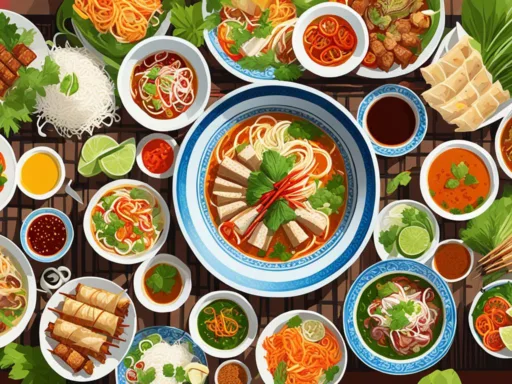Spanning a modest 30 square kilometers, the bustling enclave of Macao might seem like a tiny spec on the world map, yet it boasts a linguistic diversity that rivals that of vast nations. With a melting pot culture shaped by centuries of trade, colonial influences, and vibrant immigration waves, Macao’s linguistic landscape is astonishingly multi-dimensional. From official paperwork to casino chatter, the languages spoken in Macao transition seamlessly, painting an impressive picture of linguistic multiplicity. With Macao language statistics revealing a dominion of Chinese and an enduring presence of Portuguese, the region’s lingua-franca displays far more layers than meets the eye. Let’s embark on an exploration of the multifaceted Macao linguistic landscape and unravel the threads of communication that bind this dynamic Asian hub.
Key Takeaways
- Macao is an autonomous region with a surprisingly vast linguistic landscape, reflecting its complex history and cultural amalgamation.
- The official languages, Chinese and Portuguese, highlight the unique colonial legacy and current political ties within the languages spoken in Macao.
- Despite its small geographic size, Macao exhibits a high degree of multilingualism, showcasing deeper layers of diversity.
- English is prevalently understood and spoken in Macao, serving as a bridge in international tourism and commerce.
- The presence of languages such as Tagalog signifies the contribution of a global workforce to Macao’s society and economy.
- Macao’s use of traditional Chinese characters sets it apart from mainland China, underscoring its distinct identity within the broader Chinese cultural sphere.
Unveiling Macao’s Linguistic Diversity
Macao’s rich tapestry of languages is as diverse as its cultural heritage. Beyond the gleaming casinos and bustling streets lies a linguistic landscape that tells the story of a city at the crossroads of East and West.
A Look at the Official Languages
Within the intricate mosaic of Macao’s official languages, Chinese presides as the most broadly utilized medium of communication, particularly within the realms of government and daily life. However, Portuguese continues to hold its place, reflecting Macao’s historical ties with its erstwhile colonial European counterpart. This juxtaposition illustrates Macao’s linguistic landscape quite vividly, encompassing language diversity in Macao through formal and informal channels alike.
Macao’s Unique Linguistic Heritage
Apart from the official dialects, the creole language Patuá is an emblem of Macao’s unique linguistic heritage. A creole that evolved from a blend of Asian languages intertwined with Portuguese, Patuá has been an integral part of the identity of the Macanese community, although it is now at the brink of obscurity, with few fluent speakers remaining.
Below is a glimpse into the diversity of Macao’s linguistic landscape:
| Languages | Official Status | Community | Usage Context |
|---|---|---|---|
| Chinese (Cantonese) | Official | Majority Population | Government, Daily Life |
| Portuguese | Official | Minority Population | Legal, Administration |
| Patuá (Macanese Creole) | Historical | Macanese Community | Cultural Practices |
The Role of Language in Cultural Identity
The diverse languages of Macao not only serve as a means of communication but also play a crucial role in reinforcing the region’s cultural identity. Events like the Festival da Lusofonia are a testament to the lasting influence of the Portuguese language, not merely reflective in speech but pervasive in culture—music, cuisine, and festivities all echo this sentiment. Media and performing arts further propagate the linguistic diversity, cementing Macao’s cultural identity as multifaceted and deep-rooted.
Languages Spoken Macao: A Mosaic of Dialects and Foreign Tongues
Macao’s linguistic landscape is as vibrant and dynamic as its famed neon-lit skyline. This region, steeped in a rich history of East meets West, has fostered a multilingual environment that goes far beyond its official languages. The voices of Macao speak volumes about its role as a hub of cultural exchange and reflect the socioeconomic fabric interwoven with strands from around the world.

Languages spoken in Macao encompass a variety of dialects, stemming largely from the Chinese community. Yet, a stroll down the bustling streets reveals a tapestry of conversations in dialects such as Hokkien and Mandarin, as well as foreign languages in Macao like Tagalog, brought to the city by Filipino migrants, and increasingly influential in both daily conversation and business transactions.
- Cantonese (Predominant local dialect)
- Portuguese (Official language, less widely spoken)
- English (Business and tourism)
- Tagalog (Filipino migrant community)
- Mandarin (Increasing due to Mainland tourists)
- Hokkien and other Chinese dialects (Various communities)
Through its multilingualism, Macao does not merely host an array of languages; it encourages their intermingling and evolution, thereby creating a living, breathing microcosm of cultural diversity. This linguistic plurality not only enhances Macao’s global appeal but also embodies its spirit of inclusivity and adaptability in a rapidly shifting world.
Macao’s populace reflects a broad spectrum of cultures and languages, each adding a unique hue to the region’s vibrant multilingual mosaic.
In addition to providing everyday linguistic color, multilingualism in Macao is a clear advantage in the realms of trade, tourism, and international relations. The city’s ambition to maintain its status as a world-class destination and global business hub is supported by its capacity to communicate across cultures, a true testament to the power of language diversity.
The Predominance of Cantonese in Macao’s Linguistic Landscape
Amidst the rich tapestry of Macao dialects and the celebrated language diversity in Macao, Cantonese stands as the most prominent dialect, anchoring itself as the cornerstone of daily interactions and cultural expression. Navigating through the bustling streets of Macao, one encounters a symphony of tonal variations that reflect the intricate nature of this vibrant locale.

Cantonese: The Local Lingua Franca
As the local lingua franca, Cantonese permeates every layer of Macao’s societal fabric. Its tonal complexities and rich inflections serve as a badge of identity for the ethnically Chinese majority, creating an auditory bridge that connects the community with their ancestral roots and with each other. With a nod to the language statistics in Macao, Cantonese remains a vital tool for effective communication, commerce, and community cohesion.
Understanding Cantonese Usage and Influence
The layers of Cantonese influence in Macao extend beyond the spoken word, influencing everything from local media to the nuances of business operations. As an essential feature of Macao’s language statistics, Cantonese is not just part of the local dialect; it is a critical element that shapes societal norms and cultural continuity. The depth of its reach within the region can be seen as both a testament to its resilience and a marker of its importance in safeguarding Macao’s unique cultural narrative.
Portuguese Legacy and Its Current Standing in Macao
As a testament to its historical lineage, Macao’s relationship with the Portuguese language and culture endures to this day, reflecting the complexities of its colonial past and the multifaceted nature of its contemporary identity. The Portuguese language continues to echo through the city’s streets, an enduring component of Macao’s official languages and a thread that connects the territory to its storied heritage.
The History of Portuguese in Macao
The Portuguese legacy in Macao stands as a resonant reminder of the region’s geopolitical past, weaving a tale of cultural and administrative influence that lasted for over 400 years. This prolonged relationship has culminated in a distinctive blend of Eastern and Western traditions, where language has played a critical and inextricable role in shaping Macao’s current cultural fabric.
Portuguese Language Education and Media
The significance of Portuguese language education in Macao is emblematic of the desire to preserve this linguistic treasure. Educational institutions continue to impart knowledge of Portuguese, fostering new generations of speakers fluent in a language that bridges continents and cultures. Similarly, Portuguese media influence in Macao is discernible through the endurance of Portuguese press and broadcast services, which serve as cultural lifelines that keep the community connected both locally and globally.

- Portuguese Language Schools: Equipping students with linguistic skills necessary to navigate a multilingual society.
- Portuguese Media Outlets: Continuing to broadcast and publish, offering content that resonates with the Macanese and expat communities alike.
- Legal and Administrative Documents: Often found in Portuguese, a reflection of the language’s enduring official status.
Even as the number of native Portuguese speakers in Macao may be modest, the language’s prevalence in key societal domains underscores an abiding connection to its Portuguese legacy—one that remains an integral part of Macao’s globally recognized, diverse heritage.
Macao’s Multilingual Environment and English Usage
In the bustling locale of Macao, a fusion of East meets West, the English language emerges as an instrumental part of the region’s societal tapestry. Albeit its absence as an official language, English is a testament to the vibrant multilingualism on display—crucial in trade, commerce, and tourism sectors.
Navigating through the intricate alleyways of the city or within the opulence of international casinos, the ubiquity of English becomes apparent. Its role as an auxiliary language is especially pronounced, facilitating communication amidst an array of global visitors and business connoisseurs alike. Unsurprisingly, it positions itself alongside the native tongues, functioning as a bridge in Macao’s international dialogues.
Here’s a closer look at environments where English is predominantly used in Macao:
- Hotel and Tourism Industry: Staff are often fluent in English, providing assistance to the multitude of visitors from across the globe.
- Education Sector: English is a core subject in schools, reflecting its significance for future generations in a global economy.
- Economic Arena: English paves the way for entrepreneurs and investors, local and foreign, to engage in transactional and business endeavors.
Despite its lack of formal recognition, English carries enough weight to stand on par with the historically entrenched Portuguese and the dominant Chinese dialects within Macao’s multilingual framework. Its silent yet prominent presence is undeniably woven into the social and commercial fabric of this unique administrative region.
Patuá: Macao’s Disappearing Creole Language
In the kaleidoscopic language spectrum of Macao, the Patuá creole language stands as a poignant testimony to the region’s colonial history, a once flourishing vernacular of Macao’s Eurasian community. A genuine cultural artifact, Patuá embodies the essence of Macao’s ethnolinguistic diversity, a colorful blend of European and Asian influences. Despite its unique heritage, this Macao dialect faces the threat of extinction, casting a shadow over the linguistic diversity that it represents.
The Origins of Macanese Patuá
Patuá arose as the lingua franca among the Macanese, a cultural cocktail with ingredients sourced from as far afield as Malay, Sinhalese, and various Indian languages. These eclectic roots reflected the global paths that ran through Macao during its time as a bustling Portuguese settlement. But as time passed, Patuá’s speakers dwindled, leaving it teetering on the brink of oblivion.
Efforts to Revitalize a Language on the Brink
Recognizing Patuá’s waning voice, a spirited movement towards the revitalization of Macao dialects, specifically Patuá, has emerged. Cultural champions are laboring to preserve this irreplaceable tongue—whether it’s through literary works, vibrant theatre showcases, or initiatives that encourage its spoken form in daily life. The race is on to save this vital thread in the tapestry of Macao’s intangible heritage, underscored by UNESCO’s spotlight on the preserving Patuá language battle.
As Patuá finds itself on the edge of vanishing, these revitalization efforts bear the weight of historical preservation—a reminder that language is more than communication; it’s the lifeline of cultural identity. In the brimming linguistic ecosystem of Macao, Patuá’s survival is a testament to the fortitude of those who refuse to let the vibrancy of Macao dialects fade into silence.
Mandarin’s Growing Presence in Macao
The landscape of Macao’s languages is undergoing a significant evolution with the increasing prominence of Mandarin. This shift is deeply intertwined with initiatives from various levels of government, aimed at fostering a bilingual society that leverages the economic supremacy of Mainland China. As Mandarin becomes more interwoven with the region’s educational system, its infusion into the realms of commerce drastically reshapes the communicative currents of this vibrant city.
Government Initiatives in Promoting Mandarin
Recent policy decisions in Macao underscore a well-orchestrated effort to elevate the status of Mandarin. The government’s promotion of Mandarin is not just a cultural choice but an economic strategy. Recognizing the economic powerhouse that is Mainland China, Macao is positioning Mandarin as a pivotal bridge in these relations through overt educational policies and subtle cultural assimilation.
Mandarin in Education and Commerce
In the heartbeat of Macao’s economy—commerce—Mandarin’s role is becoming more pronounced. From local boutiques to major conglomerates, businesses are rapidly adapting to cater to a Mandarin-speaking clientele, reflecting the practical applications of Mandarin language education. Through language, Macao fosters trade and tourism, seeking to maintain its position as a hub of financial and cultural exchange in Asia.
| Area of Influence | Role of Mandarin | Impact on Macao |
|---|---|---|
| Education | Integration into curriculums from primary to tertiary levels | Enhances bilingual proficiency for future generations |
| Commerce | Main communication language for business transactions | Strengthens economic ties with Mainland China |
| Tourism | Service industry adaptation to Mandarin-speaking visitors | Drives growth in the tourism sector |
| Cultural Exchange | Facilitation of cultural events and festivals | Promotes broader cultural understanding and exchange |
Mandarin’s ascent in Macao marks a turning point where language education dovetails with economic imperatives, redefining Mandarin’s role in Macao commerce and setting a course for a future where linguistic agility translates into commercial success.
Foreign Languages in Macao and their Social Impacts
Macao’s rich tapestry of cultures is vividly illustrated in its wide array of languages. Among these, the Filipino community in Macao has brought a significant linguistic contribution to the city, with Tagalog becoming a sound of familiarity in this dazzling enclave.
The Filipino Community and the Prevalence of Tagalog
The Filipino community in Macao has grown to become an integral part of the region’s social fabric. The presence of Tagalog speakers, reflective of this vibrant demographic, has necessitated the inclusion of the Tagalog language in Macao’s melting pot of dialects. This community enriches the city with their traditions, culture, and language, creating a more diverse and inclusive atmosphere.
Other Influential Foreign Languages in Macao
In addition to Tagalog, there is a diverse range of foreign languages in Macao spoken by expatriates and tourists from around the globe. This linguistic variety has made a profound impact on the territory’s cultural life and social dynamics. With each language comes a new perspective, be it through business, cuisine, art, or education, further highlighting Macao’s language diversity as a core strength of this international hub.
Conclusion
The myriad languages spoken in Macao stitch together a vibrant tapestry that reveals a narrative of cultural wealth and historical intricacy. This multilingual heritage is a source of pride and a substantial contributor to the region’s unique global identity. Indeed, embracing the plethora of tongues, from Cantonese and Mandarin to Portuguese and English, illuminates the rich cultural diversity that Macao cherishes.
Embracing Linguistic Diversity as Macao’s Cultural Wealth
As a potpourri of East meets West, Macao’s linguistic diversity is not merely a coincidental byproduct of its past but a deliberate aspect to be celebrated. The intricate dance of dialects reflects Macao’s historical openness and serves as a foundation for its present and future. The cultural wealth of Macao is deeply intertwined with the multiplicity of languages, and recognizing this fact is essential in preserving the region’s unique cultural fabrics.
The Future of Languages in Macao’s Dynamic Society
Looking ahead, the future of languages spoken in Macao seems as dynamic as its society. Poised on the cusp of tradition and modernity, Macao must navigate the implications of changing demographics, economic imperatives, and policy directions on its linguistic landscape. The dynamic linguistic future of Macao hinges on a balance between fostering its language diversity and meeting the demands of a fast-evolving world. By championing multilingualism and adapting to emerging trends, Macao can ensure that the essence of its identity—its languages—is not merely preserved but allowed to flourish.






